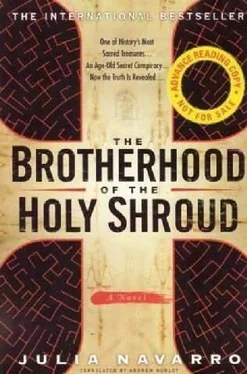Philippe owed them gold, a great deal of gold, and the more he owed, the more his resentment against the Temple seemed to grow. In Rome, too, there were religious orders that could not hide their festering envy of the Temple's power.
But in that spring of 1291, Guillaume de Beaujeu had another problem, more urgent than the intrigues within the courts of France and Rome. Francois de Charney and Said had returned from their incursion into the Mameluke camp with devastating news.
The Mamelukes dominated Egypt and Syria, and they had taken Nazareth, the city in which our Lord Jesus grew from childhood into manhood. Today, their flag flew above the port of Jaffa, scant leagues from the Templar fortress Saint-Jean d'Acre. For a month the knight and his squire had lived among them in their advance military encampment, had listened to the soldiers and shared bread, water, and prayers to Allah the Merciful with them. They had passed themselves off as Egyptian merchants who wished to sell provisions to the army. The information they had gathered led to one inescapable conclusion. In only a few days, fifteen at the most, the Mameluke army would attack Saint-Jean d'Acre. That was what the soldiers were saying, and it had been confirmed by the officers with whom. de Charney had fraternized. The Mameluke commanders had boasted that they would be rich when they seized the treasures safeguarded in the fortress at Acre, which they vowed would fall, as so many other fortresses had fallen to their armies.
The soft breeze of March presaged the intense heat of the coming months in a Holy Land watered with Christian blood. Two days ago a select group of Templars had filled chests with the gold and treasures that the Temple kept within the fortress. The Grand Master had ordered them to set sail, as soon as they were ready, on a course for Cyprus and from thence to France. None of the brothers wanted to leave, and they had pleaded with Guillaume de Beaujeu to allow them to stay and defend the city. But the Grand Master would not be swayed: The survival of the order depended in great part on them, for they were charged with saving the Templar treasure. Now all was ready for their departure.
Of all the knights, Francois de Charney was the most distraught. He had held back bitter tears when de Beaujeu ordered him on a mission far from Acre. The Frenchman begged his superior to let him stay and fight for the Cross, but de Beaujeu forbade further argument. The decision had been made.
The Grand Master descended the stairs into the cool dungeons of the fortress, and there, in a room guarded by knights, he inspected the massive chests that were soon to depart for France.
"We will divide the treasure among three galleys so as not to stake all on one. You each know which ship you will be embarking on. Be prepared to set sail at a moment's notice."
"I do not yet know my ship," said de Charney.
Guillaume de Beaujeu's iron gaze fixed upon de Charney. More than sixty years of age but still strong, his face weathered by the sun, he was one of the most veteran of the Templar knights. He had survived a thousand perils, and as a spy he had no equal unless it be his late friend Robert de Saint-Rimy, who had been killed during the defense of Tripoli when a Saracen arrow pierced his heart.
"You, good sir, will accompany me to the chapter meeting hall. We will speak there. But before you depart on your own mission, I must ask you to return to the camp of the Mamelukes. We must know whether they are able to prevent the ships from arriving at their destination, whether some ambush awaits us at sea."
The Grand Master read in de Charney's eyes the anguish it caused the old knight to leave the land that he now called his own, that life in which most nights he slept on the ground under the stars, most days rode with caravans in search of information, and for weeks at a time lost himself in Saracen camps, from which he had always successfully returned.
For Francois de Charney, returning to France was a tragedy. The master clasped his shoulder when they were alone together in the meeting hall.
"Know, de Charney, that you are the only man to whom I can entrust this mission. Years ago, when you were little more than a boy and newly initiate in the order, you and Saint-Remy brought back from Constantinople the only certain relic of our Lord, his grave cloth, upon which was imprinted his face and his figure. It is thanks to that Holy Shroud that we know the face of Jesus, and to it we pray as to the Lord Himself. This has been both our singular privilege and our sacred trust. Knowing the shifting vicissitudes of time and politics, of nations and religious hierarchies and the frailties of the human heart, we have sworn as brothers to hold this precious cloth in secrecy and safety so that it might endure through all the ages of man.
"You are now an old man but serene in your faith, and your strength and valor stand as an example to us all. It is for that reason I am entrusting you with saving the shroud of Christ our Lord. Of all the treasures we possess, this is the most precious, for not only the image but the very blood and holy essence of Jesus are entwined within its threads. You shall save it, de Charney! Once you return from the Mamelukes' camp, you shall leave for Cyprus with whatever men you may choose. You may also choose the route, whether by ship or on horseback. I trust in your good judgment, your devotion, and your strong arm in this mission to bear the Holy Shroud to France. No one must know what you are carrying; you yourself must make all the arrangements for the journey. And now, prepare yourself for your mission."
De Charney, accompanied by his faithful squire, old Said, once more infiltrated the Mameluke camp. Among the soldiers he could sense the heightened tension that preceded battle, as around the campfires they recalled their families and dreamed of the hazy images of their children, who were now growing into men and women. Soon enough the knight felt sure that no attack was planned against the Templar ships, and he sent Said back to the fortress with the word that they might sail.
For three days more the Templar listened to snatches of conversations between soldiers and among the officers and also to those of the numerous servants to the Saracen leaders, hoping for information that might aid his brothers in defending their redoubt. When he overheard one of the commanders telling his lieutenants that the attack would occur two days later, he hastened back to the fortress.
He entered Saint-Jean d'Acre as the first light of morning was turning the stone walls of the imposing Templar bastion into shimmering gold.
Guillaume de Beaujeu ordered the Templar knights to make their final preparations to resist the attack. Christians raced through the streets frantically, many overcome by hysteria when they could find no means of transport away from the fort, whose fate no one could guarantee. The last ships had sailed, and desperation was spreading among the populace.
De Charney helped his brothers to complete preparations for the defenses, rehearsed a thousand times over, and to calm the disputes among the population- there were men who were capable of killing their neighbor in order to escape.
Night was once more falling when the Grand Master sent for him.
"Dear brother, you must depart. I erred when I sent you to the Mameluke camp-now there is no ship to carry you."
Francois de Charney struggled to control his emotions.
"Master, I know. I must beg a favor. I wish to travel alone, in company with only Said."
"It will be more dangerous."
"But no one will suspect us-two Mamelukes."
"Do as you deem best, brother."
The two men embraced. It was the last time they would see each other on earth; their fates were cast. Both men knew that the Grand Master would die there, defending the fortress of Saint-Jean d'Acre.
Читать дальше












